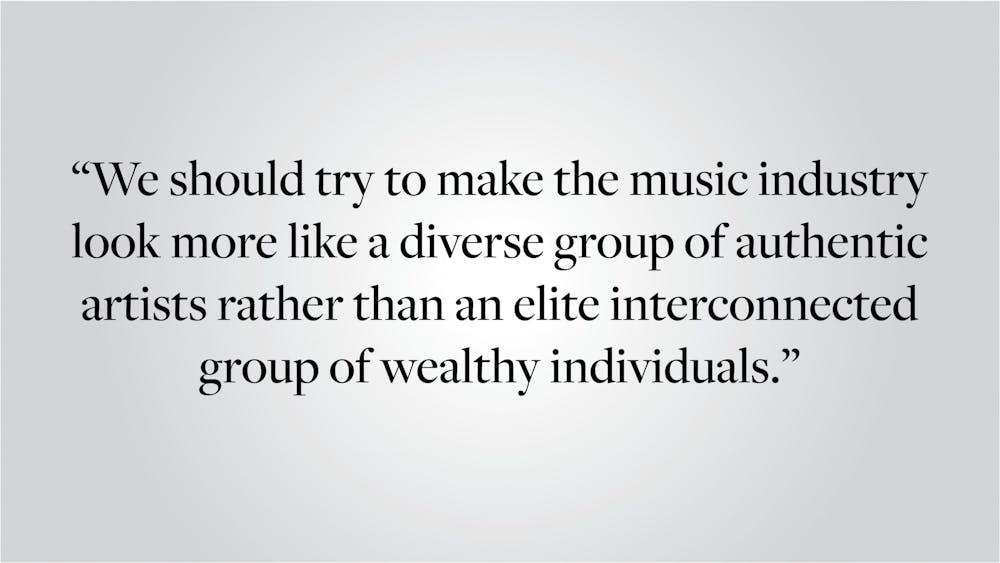Last Sunday, April 3, the 64th Annual Grammy Awards ceremony took place in Las Vegas. Hosted by the Recording Academy, the Grammys are heralded as the most prestigious music awards event in the country. But, especially in recent years, viewership is declining and critics say the awards show is becoming more and more irrelevant. In the face of a changing music industry where social media has transformed the relationship between listeners and musicians, the Grammys and other similar prestigious music awards only serve to arbitrarily stratify and assign worth to artistry in ways that benefit connected artists who are predominantly white. Because of the exclusion of Black artists and opaque selection processes, these awards shows are at best irrelevant and at worst contrary to the purpose of music and the impact that it has on listeners.
Historically, there have been major issues with how Grammys are nominated and awarded. In 2020, then-Recording Academy CEO Deborah Dugan filed a complaint with the Equal Employment Opportunity Commission alleging corruption in the voting process. Specifically, she cited “secret committees” of industry elites who undermine the voting process with undemocratic practices and claimed that members of the committees “chose artists with whom they have personal or business relationships.” While these secret committees were eliminated in 2021 and the Recording Academy has reformed the voting process, the committees still consist solely of Recording Academy members. In order to become a voting member of the Recording Academy, one must actively work in the music or recording industry. Prospective Recording Academy voting members must also be recommended by other music industry professionals. Thus, despite reforms, it nevertheless remains the case that those who vote on Grammy nominations and awards still tend to be elites within the music industry — many presumably with connections to Grammy-nominated artists.
When a group of interconnected industry professionals are given the sole authority to determine nominations and awards, the inevitable result is ambiguous and unclear methods of awarding Grammys. Viewers and music listeners have no way of knowing whether music and musicians are awarded truly due to musical impact, creativity and other merit-based traits rather than industry connections or power. The Grammys therefore comes closer to a celebration of already-established musicians and creators rather than a place to honor a more diverse and up-and-coming group of artists.
Largely because of ambiguity within the voting process and these membership restrictions, the Grammys has encountered numerous controversies concerning diversity, equity and inclusion over the years. Since the awards ceremony’s inception in 1957, only 11 Black artists have won Album of the Year. The Grammys have repeatedly received criticism for choosing white artists, particularly in major categories like Album of the Year or Song of the Year, over Black artists who popular and critical consensus deem more deserving. Most notably, in 2014, Kendrick Lamar’s “Good Kid, M.A.A.D City” lost Best Rap Album to Macklemore’s “The Heist” — and, again in 2016, Taylor Swift’s “1989” won Album of the Year over Lamar’s “To Pimp a Butterfly.” It is impossible to know exactly what caused these albums to win, but that is precisely the problem and the reason music fans were angry that Kendrick Lamar lost both times. We should have a better idea of why an artist who has produced three consecutive widely-acclaimed albums has never been able to win Album of the Year.
In addition, the Grammys consistently groups genre-bending Black artists into solely rap and R&B categories while excluding them from more prestigious categories like Album of the Year and Song of the Year. All of these controversies suggest that racism infects the Recording Academy and the general music industry. Despite the massive impact that Black artists have had on music, culture and society, they are nevertheless grouped into restrictive categories where they are overlooked, minimized and forgotten.
While this exclusion of Black artists exists in all aspects of music and popular culture, the Grammy Awards act as a prime manifestation of it. Whether purposeful or not, rewarding one artist over another makes a statement, implying that the mostly white artists who receive nominations or awards are more worthwhile and deserving of acclaim than the many non-white ones who do not. Assigning prestige to artists in such a skewed, exclusive and racist way as the Grammys has thus only makes the music industry less inclusive.
Even disregarding bias and racism within the Recording Academy, the Grammys and other prestigious music awards shows nevertheless rest upon a flawed model that stratifies the music industry and assigns worth and prestige to certain musicians and pieces of music over others. When an event as prestigious as the Grammys uses confusing and elitist methods to try to determine the value of new music, it effectively obscures what music fundamentally should be: an authentic, expressive and fluid art form. Awards shows like the Grammys thus take away from the focus on creating and listening to music that people love and identify with. Within the larger entertainment industry rife with elitism, we should try to make the music industry look more like a diverse group of authentic artists rather than an elite interconnected group of wealthy individuals. To do this, we must stop assigning worth to the Grammy Awards.
Melissa Liu ’25 can be reached at melissa_y_liu@brown.edu. Please send responses to this opinion to letters@browndailyherald.com and op-eds to opinions@browndailyherald.com.





